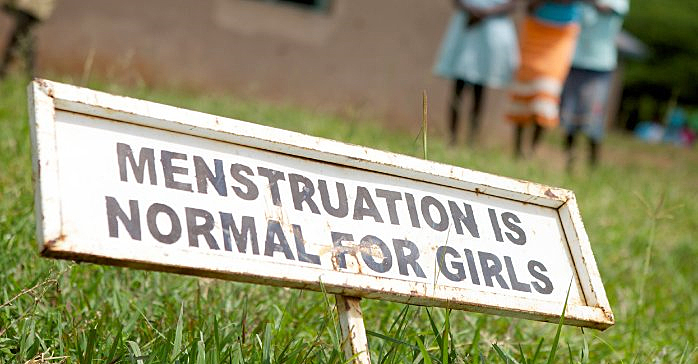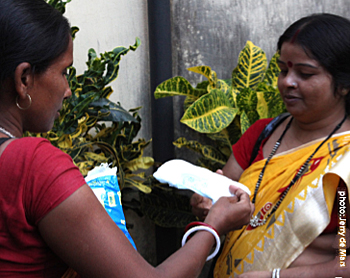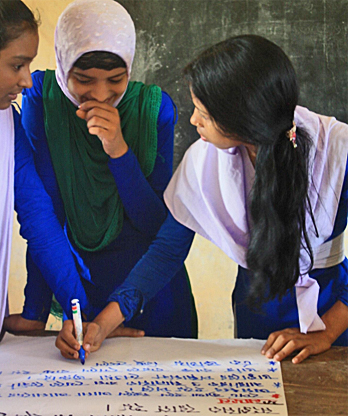New WASH facilities alone will not solve menstruation issue for school girls in Bangladesh

A new toilet will not tackle the complex issue of menstrual hygiene for girls at schools in Bangladesh. WASH facilities need maintenance, clean and running water, soap and a disposal. But girls must also have access to cheap biodegradable sanitary pads. And above all, the taboo on menstruation itself must be broken.
These are the main conclusions drawn by Dutch development organization Simavi, following an assessment of the needs of girls in grades 6-8 in six schools relating to menstruation.
This year Simavi began a new menstrual hygiene management (MHM) programme in Bangladesh, called Ritu, in close cooperation with local partners and stakeholders.
 Availability of cheap biodegradable sanitary pads is an important element of menstrual hygiene.
Availability of cheap biodegradable sanitary pads is an important element of menstrual hygiene.
Keeping girls at school
The assessment revealed that one of the most evident consequences of the current situation at schools is absenteeism. The majority of menstruating girls that were interviewed reported missing 2 to 3 days of school during their menstruation.
One of the reasons cited by girls is the lack of WASH facilities in schools but a more serious factor that was mentioned in the assessment is the general taboo on girls moving freely during menstruation.
Need for proper WASH facilities
The number of toilets in the schools for the number of students is grossly insufficient, sometimes with 8 times more students per toilet than the global recommended standard.
There is no soap or running water in the toilets, making it impossible for hygiene to be maintained.
Most of the time, girls use WASH facilities in their villages; and the girls who use cloth pads wash these in their village too. Therefore these WASH facilities form a key part of their current MHM practice.
 Another important element is the creation of a safe environment for girls to talk about their menstrual hygiene.
Another important element is the creation of a safe environment for girls to talk about their menstrual hygiene.
Normal healthy biological process for all women
The secrecy around menstruation results in a general lack of knowledge on the biological causes of reproduction, puberty and menstruation.
To address the lack of knowledge on menstrual hygiene, the recommendation is that girls must be supported to understand the changes to their bodies as part of a wider focus on gender equality, with an emphasis on self-esteem and challenging self-stigma around menstruation.
Working with teachers to ensure that they have the necessary facts and that they are prepared to teach these subjects should be prioritised. It is also recommended that training of teachers must espouses a gender equality perspective.
The cornerstone of the Ritu programme is a shift in the current school culture and the community, breaking the taboo on menstruation.
Read more about the Ritu programme and the full report (as a pdf file) on the need assessment.
This news item is based on a long read article published on the website of Simavi.
Read also on this website
● Simavi receives grant from Waterloo Foundation for behaviour change WASH-project in Tanzania, 6 April 2016
● Stockholm world water week: Let’s accelerate WASH, let’s do it differently, 27 August 2015
● IRC and Simavi call for universal access to water also in schools, clinics and at work, 5 December 2014
● SNV advocates improved menstrual hygiene management to keep Ugandan girls in school, 20 June 2013
More information
Simavi
Haarlem, the Netherlands
+31 23 531 80 55
www.simavi.org



